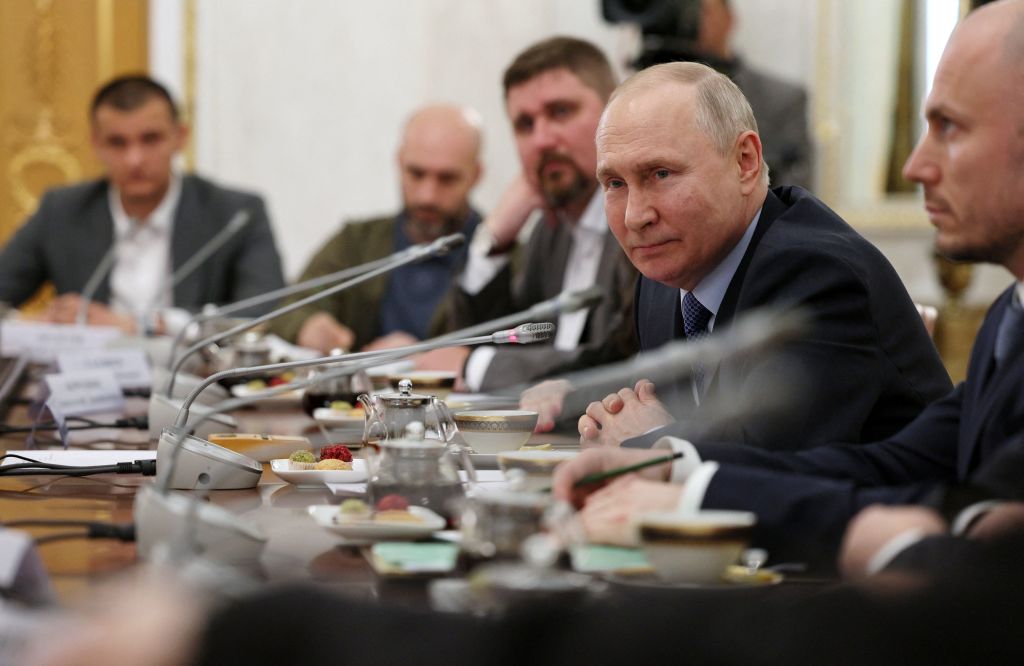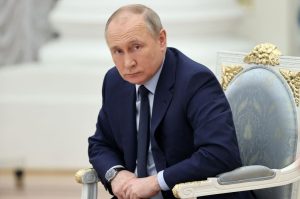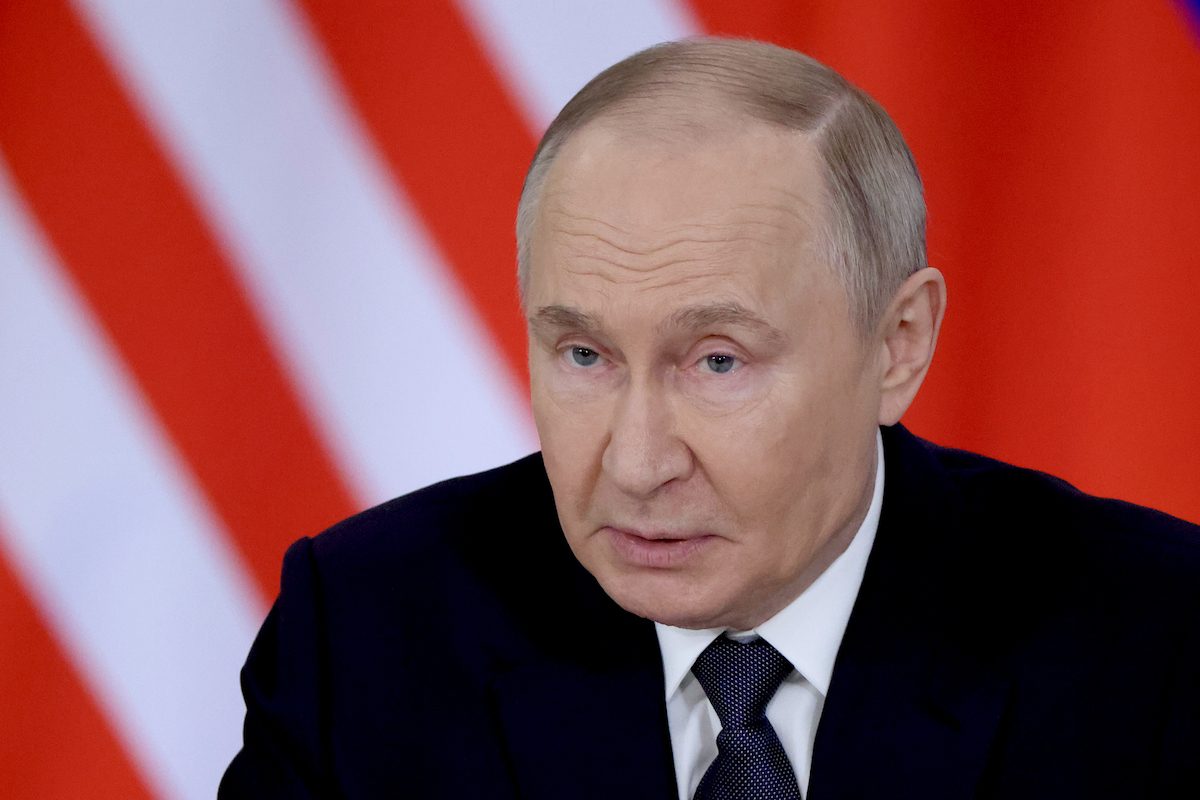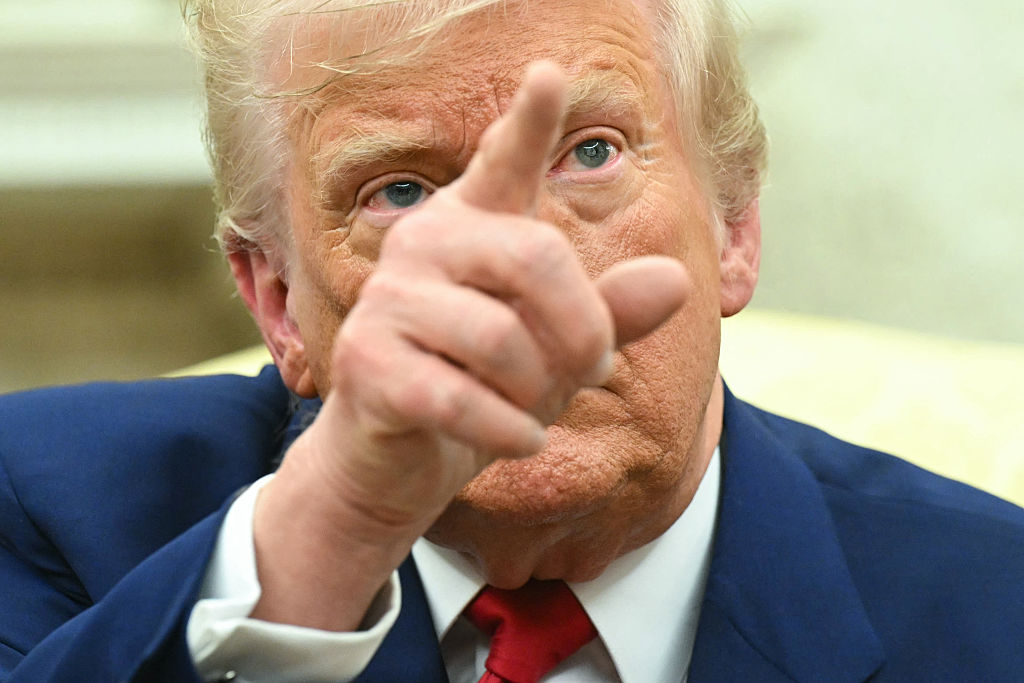Lately Vladimir Putin has been strikingly unwilling to subject himself to any serious debate about his war in Ukraine. On Tuesday, he came the closest yet, spending more than two hours talking to war correspondents working for either the state media or nationalist social media channels. It was hardly an inquisition, but there were some interesting insights into his thinking to be gleaned.
Despite the clear evidence of a steady contraction in the Kremlin’s aspirations and expectations from the original intent to conquer the whole of Ukraine, he refused to accept that the goals of the “special military operation” had changed in any way. Rather, he asserted, that although they may alter the detail “in accordance with the current situation, but in general, of course, we will not change anything, and they are of a fundamental nature for us.”
In many ways this was a direct rebuttal of recent suggestions that some kind of peace deal and thus compromises might be necessary. He claimed to respect Ukrainian sovereignty, but that this had been abused in the name of aggression: “As for someone who wants to feel Ukrainian in Ukraine and live in an independent state, for God’s sake, do what you want. We must respect this. But then don’t threaten us.”
Instead, front and center, the United States become the villains of the peace. They were the ones, Putin said, driving Ukraine to war. Indeed, the Americans are also forcing Europe to back Ukraine (something that might surprise more hawkish allies such as Poland that have been trying to push Washington into more extensive support). After all, “they don’t care about the interests of their allies. They have no allies, they only have vassals. And the vassals have begun to understand what role they were destined for.”
This is actually a subtle shift in emphasis. First, the war was against Ukraine, then Ukraine as a proxy and ally of the West, now Ukraine almost as a victim of the United States. What follows, though, is that any peace would be achieved by direct talks with the Americans: “If they really want to end today’s conflict with the help of negotiations, they only need to make one decision: to stop the supply of weapons and equipment — that’s it.”
Of course, this is a serious misreading of the complex dynamics of this war. Not least as without Western military support the Ukrainians would have a great deal more trouble defending their country, but at present every opinion poll suggests a determination to do so regardless. However, it reflects Putin’s worldview, in which a handful of great powers dictate the future of the rest. It also hints at how he thinks this war can eventually be settled, through a gentleman’s agreement between Moscow and Washington, that would inevitably bolster his increasingly threadbare claims to Russia’s great power status.
One could, of course, wonder why he thinks such a deal is needed, given his efforts to present the Ukrainian counter-offensive as a failure: “The enemy did not succeed in any sector. They have suffered serious losses… we are suffering ten times fewer casualties than the armed forces of Ukraine… According to my calculations, [Ukraine has lost] about 25, or maybe 30 percent of the equipment delivered from abroad.”
In that context, no wonder he said that there was no need for another wave of mobilizations, because casualties are low and, according to Putin, 156,000 Russians had volunteered to fight. “Under these circumstances,” he added, “the Ministry of Defense reports that, of course, there is no need for mobilization today.”
That closing comment, placing the responsibility on the Ministry of Defense (that, according to some reports, has actually been advocating a mobilization this summer) reflects a leitmotif of Putin’s statements since the start of the counter-offensive that belie his bullish claims of victory. When asked about the threat of drone strikes inside Russia he said “it would be better if this was done in a timely manner and at the proper level… I am sure that these tasks will be solved.”
As for Ukrainian sabotage operations, the law enforcement agencies needed to up their game. Meanwhile, he was sure the Ministry of Defense was looking to replace time-serving “parquet generals” with new blood that had shown its mettle in battle, but that “the bureaucracy there is the same as in any ministry.”
In short, the commander-in-chief, the man with direct authority over the police and security agencies alike, was disclaiming any real power to address any of these agencies’ failures. He was simply “hoping” that what was needed was being done. Once again, while claiming confidence, Putin seems to be lining up a lengthy list of potential scapegoats in case things go wrong.
One, indeed, might already have been identified. As part of his running feud with Yevgeny Prigozhin and his Wagner mercenary group, Defense Minister Shoigu has demanded that all such volunteers sign contracts directly with his ministry. Prigozhin has angrily refused, but Putin for once backed his minister, saying it needed to be done.
Of course, Putin has made declarations before without actually following through. Given also that this press conference was held with a very select group of commentators who would reliably treat his words with respect, it is unlikely to win over those critics who believe he is proving unable to match words with deeds. None of the bloggers associated with Prigozhin were invited, for example, nor the “turbo-patriot” Igor Girkin. He acerbically concluded that Putin’s overall strategy had become clear: “If there is the slightest opportunity to do nothing, we will definitely take advantage of this opportunity!”
This article was originally published on The Spectator’s UK website.

























